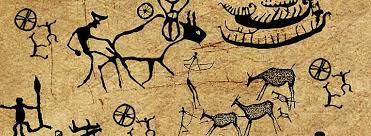primitive
英 [ˈprɪm.ɪ.tɪv]
美 [ˈprɪm.ə.t̬ɪv]
- adj. 原始的,远古的;简单的,粗糙的
- n. 原始人
使用频率:

记忆方法
1、prim- + -itive(复合后缀:-ite, -ive).
2、含义:very first, original, first or earliest of its kind, of or belonging to the first age, having the style of an early or ancient time.
2、含义:very first, original, first or earliest of its kind, of or belonging to the first age, having the style of an early or ancient time.
中文词源
primitive 原始的,远古的,简单的
来自prime,第一的,最初的,原始的,-itive,形容词后缀。
英语词源
- primitive (adj.)
- late 14c., "of an original cause; of a thing from which something is derived; not secondary" (a sense now associated with primary), from Old French primitif "very first, original" (14c.) and directly from Latin primitivus "first or earliest of its kind," from primitus "at first," from primus "first" (see prime (adj.)).
Meaning "of or belonging to the first age" is from early 15c. Meaning "having the style of an early or ancient time" is from 1680s. In Christian sense of "adhering to the qualities of the early Church" it is recorded from 1680s. Of untrained artists from 1942. Related: Primitively. - primitive (n.)
- c. 1400, "original ancestor," from Latin primitivus (see primitive (adj.)). Meaning "aboriginal person in a land visited by Europeans" is from 1779, hence the sense "uncivilized person."
权威例句
- 1. Duffy's primitive guitar playing is well below par.
- 达菲粗糙的吉他演奏技巧远不够水平。
- 2. The conditions are primitive by any standards.
- 无论用什么标准来衡量,其条件都很简陋。
- 3. It's using some rather primitive technology.
- 它使用的是非常古老的技术。
- 4. The methods of communication used during the war were primitive by today's standards.
- 按今天的标准,大战时期使用的通讯方法非常简陋。
- 5. The constitution of a primitive society is not necessarily simple.
- 原始社会的结构未必简单.
